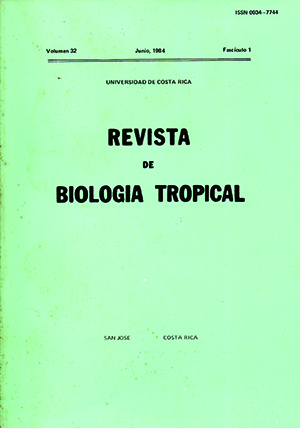Abstract
Approximately eight species of the Phorid fly, Melaloncha, were seen parasitizing honey bees, especially during the rainy season in various parts of Costa Rica. Copulation of these flies takes place in the vicinity of the beehives and around flowers visited by both species. Melaloncha apparently introduces the ovipositor through the intersegmental membranes of the abdomen of the bee, where the first larval stages develop. After the bee dies, the larva migrates to the thorax where it completes its development and pupates. Melaloncha also parasitizes Bombus Mexicanus and Melipona fasciata. Parasitism of honey bees by this Phorid has serious economic implications.
References
Borgmeier, T. 1934. O género Melaloncha Brues. Rey. R. de J. 4: 167-189.
Clausen, C.P. 1940. Entomophagous Insects. McGrawHill. N.Y. 688 p.
Lobo, M., Gilda. 1982. Algunos aspectos relaciona dos con el comportamiento de la pupación de la mosca de tórsalo Dermatobia haminis (L. Jr.) (Diptera: Cuterebridae). Tesis de grado, Escuela de Fitotecnia, Facultad de Agronomía. Universidad de Costa Rica. 42 p.
Ramírez, W. 1982. Bombus mexicanus, Cresson, un hospedante de Melaloncha, mosca parásita de la abeja de miel en el nuevo mundo. Rev. Biol. Trop. 30: 177.
Ronna, A. 1936. Observaçoes biológicas sobre dois dípteras parásitos de Apis mellifica L. (Dipt., Phoridae, Sarcophagidae), Rev. Entomol. (Río de Janeiro), 6: 1-23.
Seguy, E. 1930. Un nouveau parasite de l' abeille domestique. Encycl. Entomol. Sér. B., II Dipt., 5: 169-170.
##plugins.facebook.comentarios##

This work is licensed under a Creative Commons Attribution 4.0 International License.
Copyright (c) 1984 Revista de Biología Tropical


